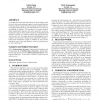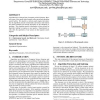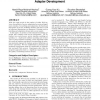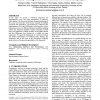139
click to vote
WWW
2010
ACM
15 years 1 months ago
2010
ACM
Sentiment classification aims to automatically predict sentiment polarity (e.g., positive or negative) of users publishing sentiment data (e.g., reviews, blogs). Although traditio...
104
click to vote
WWW
2010
ACM
15 years 1 months ago
2010
ACM
Many have speculated that classifying web pages can improve a search engine's ranking of results. Intuitively results should be more relevant when they match the class of a q...
101
Voted
WWW
2010
ACM
15 years 1 months ago
2010
ACM
As traditional media and information devices integrate with the web, they must suddenly support a vastly larger database of relevant items. Many devices use remote controls with o...
102
Voted
WWW
2010
ACM
15 years 1 months ago
2010
ACM
Algorithms are an integral part of computer science literature. However, none of the current search engines offer specialized algorithm search facility. We describe a vertical sea...
100
Voted
WWW
2010
ACM
15 years 1 months ago
2010
ACM
Audio podcasting is increasingly present in the educational field and is especially appreciated as an ubiquitous/pervasive tool ("anywhere, anytime, at any pace") for ac...
81
Voted
WWW
2010
ACM
15 years 1 months ago
2010
ACM
In this paper, we describe two examples of implementations of the Media Fragments URI specification which is currently being developed by the W3C Media Fragments Working Group. Th...
107
Voted
WWW
2010
ACM
15 years 1 months ago
2010
ACM
Popularity of content in social media is unequally distributed, with some items receiving a disproportionate share of attention from users. Predicting which newly-submitted items ...
WWW
2010
ACM
15 years 1 months ago
2010
ACM
With the rapid growth in the number of online Web services, the problem of service adaptation has received significant attention. In matching and adaptation, the functional descri...
90
Voted
WWW
2010
ACM
15 years 1 months ago
2010
ACM
In this paper we present a web-based framework for spatiotemporal screen real estate management of interactive public displays. The framework facilitates dynamic partitioning of t...
111
Voted
WWW
2010
ACM
15 years 1 months ago
2010
ACM
With the phenomenal success of networking sites (e.g., Facebook, Twitter and LinkedIn), social networks have drawn substantial attention. On online social networking sites, link r...




